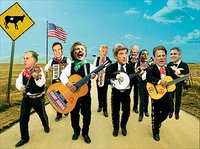View from Over There
The Economist Thursday (20 April) offered its evaluation of the up-coming elections here in the US. The main article concludes in part by saying that the Democrats' "current platform is not, as Newt Gingrich put it, a mere "Contract with San Francisco and Vermont". But neither is it a compelling vision of America's future. That said, it may be enough to win in November." Let's hope so.

Now, I can't agree with all that the Economist writes, but three key points appear accurate: 1) Republican failures have been costly and upsetting. In reference to their guarded preference for Kerry in '04, the Economist, in the leader related to the above-mentioned story, says that "Republican incompetence has exceeded even our worst fears."
2) The Democrats appear fragmented and confused; or, in the paper's words, "if the Republicans reek of decay, the Democrats ooze dysfunctionality." Now Chris has recently pointed me to an interesting essay from Washington Monthly defending the Democrats against such charges, and also to a blog entry on the American Prospect site that argues that "compared to both recent and much more longstanding historical precedent, the current Democratic opposition has not only been disciplined and unified, but effective." Whether or not that is true, it seems that folks have become obsessed with an image of Democrats as 'dysfunctional.'
The Economist, in fact, quotes Markos Moulitsas Zúniga, the DailyKos guy, and Jerome Armstrong as saying that for "the Americans in the middle, who have no strong partisan allegiances, we have failed to articulate a real plan or vision.”
This image may reflect certain realities--as the Economist points out, the Democrats have no president, no clear leader to focus their efforts. My fear, though, is that part of the appearance of confusion is the result of timidity: how is it that no one rallied to support Feingold's censure measure? The courage to say that breaking the law is bad: anyone?
In any case, the perception of 'dysfunction' is real; something must change.
Finally, 3), the Republicans have made such a mess that the Democrats seem to have a shot at taking both houses back in November. Some stats from the Economist: "Only 36% of Americans think George Bush is doing a good job as president. Even Republican states are lukewarm: his approval rating is above 50% only in Idaho, Nebraska, Utah and Wyoming. And Americans like the Republican-led Congress even less: a paltry 23% of them approve of its performance."
So far, so good. But what is the Economist's take on all of this? They argue that what the Democrats need to do is focus on 'liberal' (keep in mind this is a British paper, so liberal means more John Stuart Mill than Michael Moore) issues and abandon their support of unions and of teachers in favor of liberal (that is, free) trade. Go CAFTA, and workers' rights be damned! That and--apparently, it's hard to parse at times--stop thinking that repealing the Bush tax cuts is a reasonable goal (?).
Not that they should become Republicans: "there are plenty of areas where liberal America needs to stand up bravely for its beliefs: against the death penalty, in defence of civil liberties, sounding a warning on global warming."
Um, forgive me, but those are fine goals, and at least two of them would be a significant move away from the Bush insanity; but if that's it, if it comes down to issues like that, then I give up. The budget, the war, the exploitative trade policies: are these to be let go? And health care? (or is that a civil liberty? huh)? You've got to have health care in the mix.
In fact, I would argue that if any one issue--in addition to the obvious anti-corruption business--if any one issue should work to focus the Democrats, it ought to be health care. I'm ready.

0 Comments:
Post a Comment
<< Home